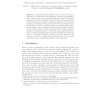Free Online Productivity Tools
i2Speak
i2Symbol
i2OCR
iTex2Img
iWeb2Print
iWeb2Shot
i2Type
iPdf2Split
iPdf2Merge
i2Bopomofo
i2Arabic
i2Style
i2Image
i2PDF
iLatex2Rtf
Sci2ools
107
click to vote
WADS
2007
Springer
2007
Springer
Priority Queues Resilient to Memory Faults
In the faulty-memory RAM model, the content of memory cells can get corrupted at any time during the execution of an algorithm, and a constant number of uncorruptible registers are available. A resilient data structure in this model works correctly on the set of uncorrupted values. In this paper we introduce a resilient priority queue. The deletemin operation of a resilient priority queue returns either the minimum uncorrupted element or some corrupted element. Our resilient priority queue uses O(n) space to store n elements. Both insert and deletemin operations are performed in O(log n + δ) time amortized, where δ is the maximum amount of corruptions tolerated. Our priority queue matches the performance of classical optimal priority queues in the RAM model when the number of corruptions tolerated is O(log n). We prove matching worst case lower bounds for resilient priority queues storing only structural information in the uncorruptible registers between operations.
| Added | 09 Jun 2010 |
| Updated | 09 Jun 2010 |
| Type | Conference |
| Year | 2007 |
| Where | WADS |
| Authors | Allan Grønlund Jørgensen, Gabriel Moruz, Thomas Mølhave |
Comments (0)

